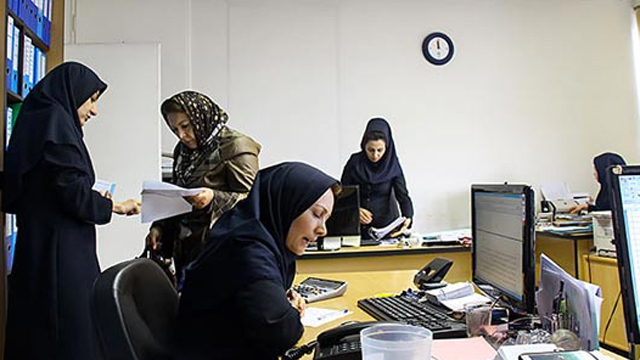New Iranian Bill Aims to Keep Women Out of Workforce

A bill that would reduce the working hours of female employees, which was passed in the last days of Iran’s outgoing Parliament on May 10, 2016, is as an attempt by the state to “bring the ‘out-of-control half of society’ back under its control,” a women’s studies expert told the International Campaign for Human Rights in Iran.
If the bill is approved by the conservative Guardian Council—the powerful body of clerics and jurists that reviews bills to ensure their compliance with Islamic law—4.3 million women in the country’s workforce will see a mandatory and substantial reduction of their working hours. Some women’s rights activists have argued that the bill could encourage employers to fire their female workers, and make it harder for women to find jobs.
Decreased Employment Prospects
The “Reduction of Office Hours Act For Women With Special Circumstances” would reduce women’s working hours by six hours a week, said MP Abdolreza Azizi on April 22, 2016. “Employers who fire their female staff because of reduced working hours will be dealt with,” added Azizi, the chairman of the Social Affairs Committee in Parliament.
But the reduced working hours would harm women’s job security in the short and long term, the women’s studies researcher Nasrin Afzali told the Campaign in an interview.
“Women who are currently working may welcome this plan,” she said. “But women who are just planning to get into the workforce may feel the greatest impact because employers may not hire them at all under these circumstances.”
As for employed women, Afzali said “the danger is that they will definitely be the first to get fired when their employer decides to make job cuts. Also, women will not be a priority for promotions because firms would not be able to count on their full-time presence.”
New Female MPs
A record 18 women were elected to the new Parliament in Iran’s February 2016 elections, but will they be able to change discriminatory laws against women? Afzali said that the larger number of female MPs in Parliament was an encouraging sign, but warned that people shouldn’t get their hopes up about the kind of impact the new MPs would have.
“You cannot be hopeful and certain about the effectiveness of [female MPs],” Afzali told the Campaign. “After all, the state’s overall policies are aimed at giving jobs to men as much as possible while returning women to their traditional role.”
“Looking at [past] legislations, the Iranian Parliament has not only been negligent towards the interests of women, but families as well,” she said. “The family is a safe and secure institution for every member of society and all members of a family should have equal rights, but we cannot say that Parliament and the state have served the interests of families. Instead…the state’s ideology is strengthened with patriarchal laws. With these laws the state wants to see the continuing dominance of traditional ways imposed on Iranian families and return women to their caretaking roles.”
Women, Family and Economics
Another bill that aims to control and limit women’s presence in the workforce is the Comprehensive Population and Family Plan, which was first discussed in Parliament’s Cultural Affairs Committee in May 2013, and approved by Parliament on November 4, 2015. (The Guardian Council has not yet approved it and so it is not yet law.)
The plan supports and promotes views held by Iran’s supreme leader, Ali Khamenei, which hold that a woman’s primary role is to raise children. The conservative proponents of the plan believe that allowing women into the workforce has weakened the foundations of family life, leading to increased instances of divorce and a lower birth rate.
“This plan includes economic incentives for women to stay home and take care of elderly family members,” Afzali told the Campaign. “It puts pressure on women to accept family roles that may be economically beneficial and helpful to ailing family members but that have nothing to do with their professional abilities or education level and therefore would not allow them to grow and have a future.”
Controlling Women’s Bodies
The most important objective of Iran’s discriminatory laws against women is for the state to regain control of women’s bodies, Afzali told the Campaign.
“These days more than ever before women are trying to be in control of their bodies in the sense that they decide when to get married and have children or whether to delay marriage or not to have any children at all,” she said. “They could even have an abortion. The average number of children per family has gone down while at the same time more women are seeking jobs and higher education.”
“These are all things that go against the state’s dominant ideology and its desire to control women’s bodies and aspirations,” added Afzali. “Therefore the state tries to introduce laws that restore its control over the half of society it feels it has lost control over.”
Iran maintains one of the world’s lowest percentages of women in the workforce. According to Iran’s Management and Planning Organization, women hold only 11 percent of the country’s jobs.
A study by sociologist Mehrdad Darvishpour indicates that despite Iranian women’s significant advances in education since the country’s revolution in 1979, gender discrimination, the patriarchal fabric of families and the state’s anti-women ideology have all held women back from professional progress.






